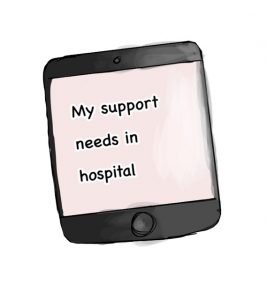
This is a plain language version of “COVID-19 Advocacy Tool Kit: Advocating for Your Support Person, Attendant or Communication Assistant to be with You in Hospital During the COVID-19 Pandemic”.
This paper gives information about the law and tips. This information is for people with disabilities who need their support person or attendant to be with them in hospital during the COVID-19 pandemic.
The information in these Advocacy Tips is about laws and policies in Ontario. It may not be for you if you live outside of Ontario.
PEOPLE WITH DISABILITIES HAVE A RIGHT TO ACCESSIBLE HEALTH CARE
As a person with a disability, you have a right to accessible health care. In Ontario, this right is in a law called the Human Rights Code. This law says that getting health care from a doctor, nurse or hospital must be accessible.
Each person with a disability will need different accommodations to make health care accessible.
 Some people need to have a support person or attendant with them when they go to hospital. For example, some people need a family member with them to help them feel safe, calm and ready to get X-rays, shots, or other treatments. Some people don’t speak but instead use sounds and movements. They might need a support person to make sure that doctors and nurses understand what they mean.
Some people need to have a support person or attendant with them when they go to hospital. For example, some people need a family member with them to help them feel safe, calm and ready to get X-rays, shots, or other treatments. Some people don’t speak but instead use sounds and movements. They might need a support person to make sure that doctors and nurses understand what they mean.
Support persons could be paid, like personal support workers. Or they could be people close to you who are not paid, like close family members or friends.

During the COVID-19 pandemic, many hospitals have visitation bans. These bans are important to keep people safe and help stop the spread of COVID-19.
But, because of these bans, some hospitals are not allowing support persons or attendants to be with people with disabilities in hospital.
If a person with a disability needs a support person or attendant when they are in hospital, this should be allowed as long as the hospital can make sure that things are done to keep everyone as safe and healthy as possible.
For example, the hospital might only let the person with a disability have 1 support person with them. The support person might have to wear a mask and might have to stay in hospital for the whole time the person with a disability is there.
ADVOCACY TIPS
Here are some things you can do if you need your support person or attendant to be with you in the hospital.
You may need to ask for help or support to do some of these things.
If possible, get prepared. Before you go to hospital:
Get a letter from your family doctor or specialist.
The letter should say what disabilities you have, and what the hospital needs
to do to make things accessible for you.
 Write your own letter or record your own video. Explain that
Write your own letter or record your own video. Explain that
you have disabilities and you need your support person or
attendant with you.Explain that your support person, attendant
or communication assistant is not a visitor. Explain what they will
do to help you get health care services from the hospital.
- Use a form. There are forms you can fill out to give the hospital information about what supports you need. You can fill out the form. Or you can look at the form and decide which things in it are important for you. You can use the form to help you write your own letter or make your own video.
- Here are some examples of forms:
- “Communication Passport” developed by Communication Disabilities Access Canada: https://www.cdacanada.com/wp-content/uploads/2020/03/COVID-Communication-Toolkit-1.pdf
- “COVID-10 Hospital Transfer Form” developed by Surrey Place and the Centre for Addiction and Mental Health for caregivers of people with intellectual and developmental disabilities: https://ddprimarycare.surreyplace.ca/
- If possible, make a few copies of the letter from your doctor and your own letter or video. If you have a smart phone or tablet, save the letters there. Give a copy to your support person or attendant.
- If you need supports to make decisions about your health care, it is a good idea to write a letter or record a video explaining this. If you are not able to make your own health care decisions in the hospital, then Ontario law says that another person will make those decisions for you. This other person could be a family member, your Power of Attorney for Personal Care or a Guardian of the Person. In most cases, hospital administrators are not allowed to make these decisions. If you need legal advice about this, you can call ARCH.
Pack a small emergency bag with things that you might need 
while you are in hospital. Leave the bag near your front door.
Make sure the letters and/or video are inside.
Before you go to hospital – if you have an appointment or
know you are going to hospital:
- Find out what rules the hospital has about visitors. This is called the hospital’s visitor policy. In Ontario, each hospital has its own visitor policy. Check the hospital’s website or call the hospital. Many hospitals have rules that say no visitors allowed. This is important for keeping people safe and stopping the spread of COVID-19. Even though no visitors are allowed, most hospitals will let a visitor in if a person in hospital absolutely needs the visitor there.

- Call ahead and let the hospital know that you are coming and you need your support person or attendant to be with you. If you can, offer to email the letter from your doctor and the letter or video you created. You can call the hospital department you are going to or the hospital’s accessibility coordinator, if they have one.
When you get to hospital:
 Tell the hospital staff that you need your support person or attendant to be with you. Show them the letter from your
Tell the hospital staff that you need your support person or attendant to be with you. Show them the letter from your
doctor and the letter or video you made. Explain that your support person, attendant or communication assistant is not a
visitor. Explain that you need them there to help you get health
care at the hospital.
- If the hospital staff don’t let your support or attendant stay, ask to speak with the nurse or doctor who is in charge of the department or floor you are on.
- If the answer is still no, ask to speak with the hospital’s accessibility coordinator, patient relations coordinator, patient ombudsman, and/or patient advocate.
- You could also call your local MPP for help. To find you MPP’s phone number go to: https://www.ola.org/en/members/current
- If you are a person with a disability living in Ontario, you can call ARCH for free, private legal advice.
- Telephone: 416-482-8255
- Tel. Toll-free: 1-866-482-2724
- https://archdisabilitylaw.ca/services/legal-services/
- You could think about making a complaint to the provincial Patient Ombudsman. For more information go to: https://patientombudsman.ca/
While you are in hospital:
- Keep the letter from your doctor and the letter or video you made close by. If the hospital changes its rules or if you get moved to another department or floor, you may need to explain why you need your support person or attendant to go with you.
- If the hospital lets your support person or attendant in, ask the hospital to give you a letter about this.

*DISCLAIMER: The information provided in these materials is not intended to be legal advice. Consult a lawyer or legal worker if you need legal advice on a specific matter. This information is current as of May 5, 2020.
Please note that the information in this Toolkit does not apply to all situations. A person’s accommodation needs may vary over time and at different points in the day. Always ask the person with the disability how to most appropriately accommodate them.
© ARCH Disability Law Centre, 2020
Images by Giuliana Barrow Lattanzio
Advocating for Your Support Person or Attendant to be with You in Hospital During the COVID-19 Pandemic (05-05-2020)
This on website called ARCH Disability Law Centre you can go to link click here


